高考英语作文从句
高考英语作文三大从句汉译英练习
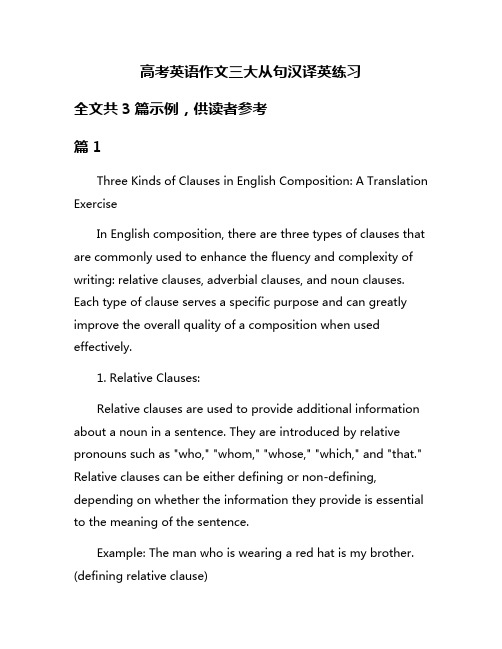
高考英语作文三大从句汉译英练习全文共3篇示例,供读者参考篇1Three Kinds of Clauses in English Composition: A Translation ExerciseIn English composition, there are three types of clauses that are commonly used to enhance the fluency and complexity of writing: relative clauses, adverbial clauses, and noun clauses. Each type of clause serves a specific purpose and can greatly improve the overall quality of a composition when used effectively.1. Relative Clauses:Relative clauses are used to provide additional information about a noun in a sentence. They are introduced by relative pronouns such as "who," "whom," "whose," "which," and "that." Relative clauses can be either defining or non-defining, depending on whether the information they provide is essential to the meaning of the sentence.Example: The man who is wearing a red hat is my brother. (defining relative clause)My dog, which is white, loves to play in the park. (non-defining relative clause)2. Adverbial Clauses:Adverbial clauses are used to modify a verb, an adjective, or another adverb in a sentence. They provide information about when, where, why, how, and under what conditions something happens. Adverbial clauses are introduced by subordinating conjunctions such as "although," "even though," "because," "since," "if," and "when."Example: I will go to the store if it stops raining. (conditional adverbial clause)She smiled when she saw her friend. (time adverbial clause)3. Noun Clauses:Noun clauses are used to function as the subject, object, or complement of a sentence. They are introduced by conjunctions such as "that," "if," "whether," and "who." Noun clauses are commonly used after verbs of thinking, knowing, saying, and reporting.Example: I know that you are busy. (noun clause as the object of the verb "know")She wants to know who will be attending the party. (noun clause as the complement of the verb "know")In conclusion, mastering the use of relative clauses, adverbial clauses, and noun clauses is essential for improving the complexity and fluency of English composition. By incorporating these three types of clauses into your writing, you can make your sentences more engaging and expressive. Practice using these clauses in your writing to become more proficient in English composition.篇2Title: Practice of Translating Three Major Clauses in English Composition for College Entrance ExaminationIn the English composition section of the college entrance examination, mastering various sentence structures is essential to achieving a high score. Among them, three major clauses play a crucial role in enhancing the fluency and coherence of the writing. These three clauses are the adjective clause, adverbial clause, and noun clause. In this article, we will elaborate on these three types of clauses and provide examples for practice.1. Adjective Clause:An adjective clause is a dependent clause that functions as an adjective in a sentence. It describes a noun or pronoun in the main clause. The following are some examples of adjective clauses:- The girl who is sitting next to me is my best friend.- The book that I borrowed from the library is very interesting.2. Adverbial Clause:An adverbial clause is a dependent clause that functions as an adverb in a sentence. It modifies a verb, adjective, or adverb in the main clause. The following are some examples of adverbial clauses:- I will study hard so that I can pass the exam.- She runs faster than I do.3. Noun Clause:A noun clause is a dependent clause that functions as a noun in a sentence. It can be used as the subject, object, or complement of a verb. The following are some examples of noun clauses:- What he said was not entirely true.- I know where he lives.By practicing the translation of these three types of clauses, students can improve their understanding of English grammar and enhance their writing skills. It is essential to pay attention to the structure and meaning of each clause to ensure accurate translation. Additionally, practicing these clauses in context is crucial for applying them effectively in writing tasks.In conclusion, mastering the three major clauses in English composition is vital for success in the college entrance examination. Through consistent practice and application, students can build their confidence and proficiency in using these clauses in their writing. By honing their skills in translating adjective clauses, adverbial clauses, and noun clauses, students can showcase their language proficiency and creativity in their compositions.篇3Three major types of clauses in English are essential for constructing complex and varied sentences: relative clauses, adverbial clauses, and noun clauses. Mastering the usage and structures of these clauses is crucial for achieving a high score in the English section of the college entrance exam.Relative clauses, also known as adjective clauses, provide additional information about a noun in the main clause. They are introduced by relative pronouns such as "who," "which," and "that." For example, in the sentence "The book that I borrowed from the library was very interesting," the relative clause "that I borrowed from the library" provides extra information about the book.Adverbial clauses, on the other hand, function as adverbs to modify verbs, adjectives, or other adverbs in the main clause. They are introduced by subordinating conjunctions such as "because," "although," and "while." For instance, in the sentence "She passed the test because she studied hard," the adverbial clause "because she studied hard" explains why she passed the test.Noun clauses act as nouns in a sentence and can function as subjects, objects, or complements. They are introduced by words such as "that," "whether," and "if." For example, in the sentence "I don't know whether he will come to the party," the noun clause "whether he will come to the party" acts as the object of the verb "know."To excel in the English section of the college entrance exam, students must be able to identify and correctly use these threetypes of clauses in their writing. Practicing exercises that involve translating sentences between Chinese and English will strengthen understanding and proficiency in using relative clauses, adverbial clauses, and noun clauses effectively.In conclusion, mastering the three major types of clauses in English is crucial for success on the college entrance exam. Students should practice translating sentences that involve relative clauses, adverbial clauses, and noun clauses to enhance their language skills and improve their performance in the English section of the test. With dedication and practice, students can confidently navigate complex sentence structures and achieve their desired scores in the exam.。
英语作文常用从句句型

英语作文常用从句句型一个句子必须按照一定的模式来组织,这个模式称为句式。
比如排比句式,命令句式等等。
下面店铺收集英语作文常用从句句型及相关联系,供大家参考。
高考英语作文8种实用句型(高考复习英语)一.开头句型1.As far as ...is concerned 就……而言比如说:就我而言 As far as I concerned2 It can be said with certainty that... +从句可以肯定地说......3.As the proverb says,正如谚语所说的,可以用来引用名言名句4 .It has to be noticed that... 它必须注意到,...5 .It's generally recognized that... 它普遍认为...6 .It's likely that ... 这可能是因为...7 .It's hardly that... 这是很难的......8 There's no denying the fact that...毫无疑问,无可否认9 .Nothing is more important than the fact that... 没有什么比这更重要的是…10 .what's far more important is that... 更重要的是…二.衔接句型1.A case in point is ... 一个典型的例子是...3 But the problem is not so simple. Therefore,+句子(然而问题并非如此简单,所以……)4 .But it's a pity that... 但遗憾的是… it’s a pity that….遗憾的是。
5 In spite of the fact that...尽管事实...... In spite of 尽管6 .Further, we hold opinion that... 此外,我们坚持认为,...7 .However , the difficulty lies in..+名词或者动名词 .然而,困难在于…8.Similarly, we should pay attention to... 同样,我们要注意...9 As it has been mentioned above...正如上面所提到的… (可以用来对前面所说的话进行补充说明)10.In this respect, 从这个角度上11.However, 然而…三.结尾句型1.I will conclude by saying... 最后我要说…2.Therefore, we have the reason to believe that...因此,我们有理由相信…3.All things considered,总而言之 = In a word=In conclusionIt may be safely said that...它可以有把握地说......4.Therefore, in my opinion,因此,在我看来,5.From what has been discussed above, we may safely draw the conclusion that….通过以上讨论,我们可以得出结论…6.The data/statistics/figures lead us t o the conclusion that….通过数据我们得到的结论是,....7.It can be concluded from the discussion that...从中我们可以得出这样的结论8.From my point of view, it would be better if...在我看来,如果……也许更好四.举例句型1. Here is one more example这里有不止一个的例子.2.Take … for example.就拿……为例子五.常用于引言段的句型1. Some people think that …. 有些人认为…To be frank, I can not agree with their opinion for the reasons below. 坦率地说,我不能同意他们的意见,理由如下。
高分句式之状语从句 2024年高考英语写作高分句式

If I were you, I would do more reading to broaden my horizon.
14 If convenient, can you ...? 方便的话,您能不 能……?
方便的话,您能否尽早给我回信?(咨询信写作)
4 had (just) done sth. ... when ... 刚一做某事 ,这时突然……
我刚一写完作业,就停电了。(记叙文写作;读后续写)
I had just finished my homework when the power went out.
5 As time went by/passed, ... 随着时光的流逝, ……
随着人工智能的发展,我们的生活会变得越来越好。(科技话题写作)
As artificial intelligence develops / advances, our life will be better. [= we will lead a better life.]
7 It will be +一段时间+ before ...
21 so/such ... that ...如此…以至于…
Many adolescents are so addicted to playing online games that they are ruining their study and health.
22 so that ...为了…/结果… (引导目的或结果状语 从句)
19 as soon as... immediately/instantly/the moment+句子,… No sooner had 主语 done… than… Hardly/scarcely had 主语 done…when…一…就… On/Upon doing sth, …
高考英语作文中百搭的万能句型
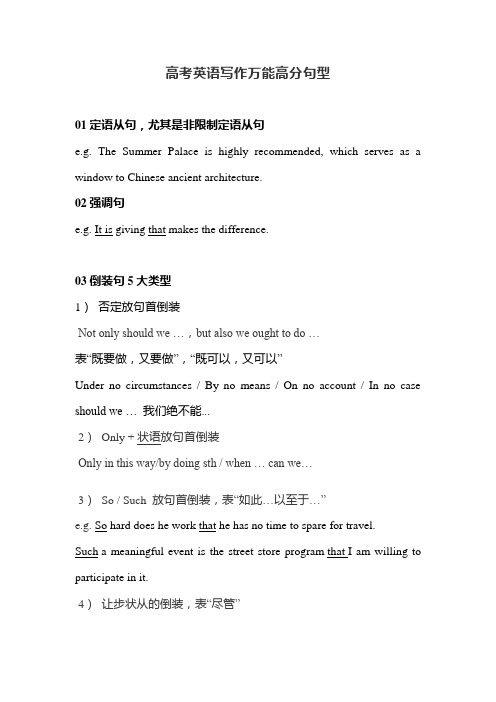
高考英语写作万能高分句型01定语从句,尤其是非限制定语从句e.g. The Summer Palace is highly recommended, which serves as a window to Chinese ancient architecture.02强调句e.g. It is giving that makes the difference.03倒装句5大类型1)否定放句首倒装Not only should we …,but also we ought to do …表“既要做,又要做”,“既可以,又可以”Under no circumstances / By no means / On no account / In no case should we … 我们绝不能...2)Only + 状语放句首倒装Only in this way/by doing sth / when … can we…3)So / Such 放句首倒装,表“如此…以至于…”So hard does he work that he has no time to spare for travel.Such a meaningful event is the street store program that I am willing to participate in it.4)让步状从的倒装,表“尽管”e.g. Convenient as/though digital reading is, it will not replace traditional reading in a million years.5)if虚拟语气从句中的倒装e.g. Were I a participant of this event, I would appeal to my friends to get involved in it.04祈使句,+and / or +完整句子e.g. Smile at our life, and we are sure to get a smile in return.05固定句型1) There is no doubt that …毫无疑问的是2) There is no denying that…不容否认的是3) There is no need to do sth做某事没有必要4)There is an urgent need to do sth做某事很有必要,很紧急5) There is no point / sense in doing sth做某事没有意义6) It doesn’t make (much) sense to do sth做某事没道理/意义7) It is no good/use doing sth做某事没好处/没用8) It is high / about time that sb did / should do sth是时候做某事了9) The time is ripe for sb to do sth做某事的时机已经成熟了10) It goes without saying that …某事是不言而喻的11) It is likely that … = There is a high possibility that… = (The) chances are that …很有可能12) It is not uncommon for sb to do sth; It is not uncommon that sb do sth某事很常见13) It is a must for sb to do sth做某事是必须的14) What impresses me most is that …使我印象最深刻的是…15) It is not A but B that really counts.不是A而是B才是真正重要的16) It is A rather than B that make a difference.产生影响、发挥作用的不是B而是A17) It is important / necessary for sb either to do A or do B某人要么做..要么做..是很重要/必要(等)的18) This is especially true when it comes to …当提到… 这一点也很适用19) (Doing) sth is the key to doing sth(做)某事是…的关键,很重要20) Doing sth is also a good choice / a wise option. …也是一个不错的选择/ 英明的抉择06主题句、承上启下句1) When it comes to ..., I hold the view that …当提到…,我认为…2) I applaud / am in favor of / stand up for / can’t agree more with one's viewpoint that …我赞同某人…的观点3) Every coin has two sides, and sth is no exception.凡事有利有弊,…也不例外4) Just like a double-edged sword, sth has both advantages and disadvantages.就像一把双刃剑,…既有利也有弊5) The reasons why … can be listed as follows.某事的原因可以罗列如下6) There are many factors that can account for sth有很多因素可以解释某事07有文采的词句表达(恰当的习/ 谚语,常用的比喻等)1) sb / sth has become a household name 家喻户晓2) a blessing in disguise伪装成坏事的好事,祸中有福3) stop eating for fear of chocking因噎废食4) look on the bright side (of sth)(对坏情况),看到光明的一面,持乐观态度5) Every cloud has a silver lining.黑暗中总有一线光明,困境中也有积极面6) a stepping stone towards success通向成功的垫脚石7) climb the ladder of success攀登成功的阶梯8) keep the sacred lamp of friendship burning all our life使神圣的友谊之灯长明9)Where others see failure, they see possibility. Where others see a closed door they see an open window.10)When one door of opportunity closes, another will open.11)Every failure is a stepping stone towards success, and we keep learning along the way.12)A proper goal is like a lighthouse, guiding us in the darkness towards the right direction.13)We can find in real books the peace which has almost disappeared ina chaotic and fast-paced world.14) Life is like a winding path surrounded by flowers, butterflies and delicious fruits, but many of us blindly spend much time looking for happiness around the next corner.15) Only when we make good use of the precious time can we win the race against time.。
高考英语作文富有文采的状语从句
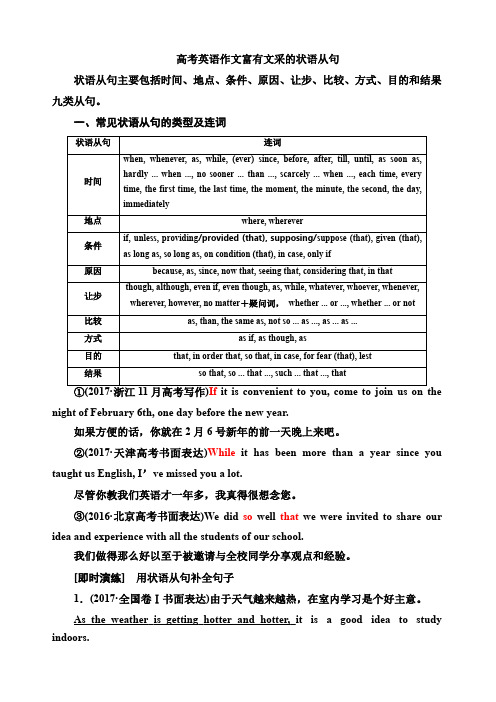
高考英语作文富有文采的状语从句状语从句主要包括时间、地点、条件、原因、让步、比较、方式、目的和结果九类从句。
一、常见状语从句的类型及连词night of February 6th, one day before the new year.如果方便的话,你就在2月6号新年的前一天晚上来吧。
②(2017·天津高考书面表达)While it has been more than a year since you taught us English, I’ve missed you a lot.尽管你教我们英语才一年多,我真得很想念您。
③(2016·北京高考书面表达)We did so well that we were invited to share our idea and experience with all the students of our school.我们做得那么好以至于被邀请与全校同学分享观点和经验。
[即时演练]用状语从句补全句子1.(2017·全国卷Ⅰ书面表达)由于天气越来越热,在室内学习是个好主意。
As_the_weather_is_getting_hotter_and_hotter,_it is a good idea to study indoors.2.(2016·全国卷Ⅱ书面表达)我记得上次你参观我们学校时给我展示了那个主题的一些照片。
I remember you showed me some photos on that theme the_last_time you visited our school.3.他们走了约30英里才看见一个村庄。
They walked about 30 miles before_they_saw_a_village.4.尽管因特网有很大帮助,但我认为在上面花太多的时间不是好主意。
Although/Though_the_Internet_is_of_great_help,_I don’t think it’s a good idea to spend too much time on it.5.只要你坚持下去,就一定会成功。
高考英语作文重点句型

高考英语作文重点句型在高考中,阅卷老师看英语作文的时候看重的是逻辑思维和重点句型,你想知道今年的高考中有哪些重点句型吗?下面是店铺给大家精心挑选的高考英语作文重点句型,希望大家喜欢!供你参考和阅读!英语作文:条件状语从句When / So long as / As long as / Once +从句,+主句。
(从句也可以放在主句之后。
)如:As long as you give me any money, I will let you go.只要你给我一些钱,我就让你走。
Once you have begun to learn English, you should learn it well. 一旦你开始学习英语,你应该把它学好。
句型1.主句+on condition that+从句.如:I will go with you on condition that you give me a sum of money.我和你一起去的条件是你给我一些钱。
句型2.主句+unless+从句.(注意:由于unless本身是否定词,所引导的从句的谓语动词用肯定而不用否定。
)如:I will go there tomorrow unless it rains.我明天去那儿除非下雨。
句型3.祈使句,+and/ and then+主句。
(注意:祈使句也可用一个名词短语。
)如: Use your head, and you will find a good idea.动脑筋想一想,你就会想出一个好主意。
Another word, and I will beat you.你再说一句,我就揍你。
句型4.If +necessary / impossible/ important等,+主句.(注意:if与形容词之间的it is被省略。
)如:If necessary, I will do it. 如果有必要的话,我来做此事。
高考英语作文句型:让步状语从句

高考英语作文句型:让步状语从句(1)、疑问词+ever whatever, whoever, whichever, whenever,wherever, however用来引导让步状语从句,相当于no matter和what, who, which, when, where, how连用。
[例句]Whatever (=No matter what) may happen, we shall not lose hope.无论发生什么事,我们都不能失去希望。
Whatever reasons you (may) have, you should carry out a promise. 无论你有什么理由,你都应该遵守诺言。
Whoever (=No matter who) comes, he will be warmly welcome. 无论谁来,都会受到热烈欢迎。
Whenever (=No matter when) it happened, it was certainly not yesterday.此事无论发生在何时,但绝不是昨天。
Whenever you (may) call, you will find her sitting by the window. 无论什么时候你去找她,你都会看到她坐在窗边。
Wherever (=No matter where) he went, he made friends with people.Whichever (=No matter which) of them you many choose, the quality will be the same.他们当中不论你选哪一个,品质都一样。
However (=No matter how) hard I have tried, I can’t find the answer.(2)、whatever, whoever, whichever, whomever等引导名词性从句,这时不能用no matter+疑问词替换。
英语作文句子 宾语从句

英语作文句子宾语从句1. I believe that education is the key to success.我相信教育是成功的关键。
2. She asked me when the project would be completed.她问我项目什么时候会完成。
3. They don't know why he is always late for meetings.他们不知道为什么他总是迟到会议。
4. I wonder if you could help me with my homework.我想知道你能否帮我做作业。
5. He told me where he had hidden the treasure.他告诉我他把宝藏藏在哪里。
6. We are excited to learn what the future holds for our company.我们很兴奋地想知道未来对我们公司意味着什么。
7. They are considering whether to invest in the new technology.他们在考虑是否要投资于新技术。
8. I'm not sure if she will attend the party.我不确定她是否会参加派对。
9. The teacher asked the students why they hadn't completed their homework.老师问学生们为什么他们没有完成作业。
10. We are curious to know if the rumors are true.我们很好奇想知道这些传言是否属实。
主语从句万能模板高考作文
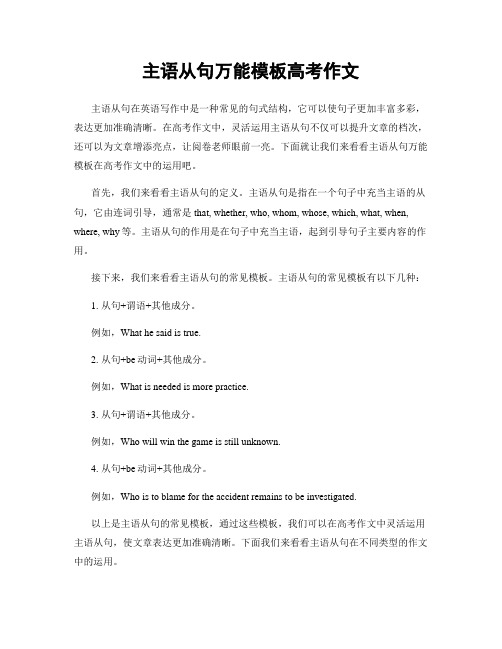
主语从句万能模板高考作文主语从句在英语写作中是一种常见的句式结构,它可以使句子更加丰富多彩,表达更加准确清晰。
在高考作文中,灵活运用主语从句不仅可以提升文章的档次,还可以为文章增添亮点,让阅卷老师眼前一亮。
下面就让我们来看看主语从句万能模板在高考作文中的运用吧。
首先,我们来看看主语从句的定义。
主语从句是指在一个句子中充当主语的从句,它由连词引导,通常是that, whether, who, whom, whose, which, what, when, where, why等。
主语从句的作用是在句子中充当主语,起到引导句子主要内容的作用。
接下来,我们来看看主语从句的常见模板。
主语从句的常见模板有以下几种:1. 从句+谓语+其他成分。
例如,What he said is true.2. 从句+be动词+其他成分。
例如,What is needed is more practice.3. 从句+谓语+其他成分。
例如,Who will win the game is still unknown.4. 从句+be动词+其他成分。
例如,Who is to blame for the accident remains to be investigated.以上是主语从句的常见模板,通过这些模板,我们可以在高考作文中灵活运用主语从句,使文章表达更加准确清晰。
下面我们来看看主语从句在不同类型的作文中的运用。
在议论文中,我们可以使用主语从句来引出论点,使文章更加有说服力。
例如,What we should bear in mind is that honesty is the best policy. 在说明文中,我们可以使用主语从句来引出要说明的事物,使文章更加生动有趣。
例如,What makes him different from others is his determination. 在记叙文中,我们可以使用主语从句来引出故事的主要内容,使文章更加引人入胜。
高三英语作文写作经典万能句型
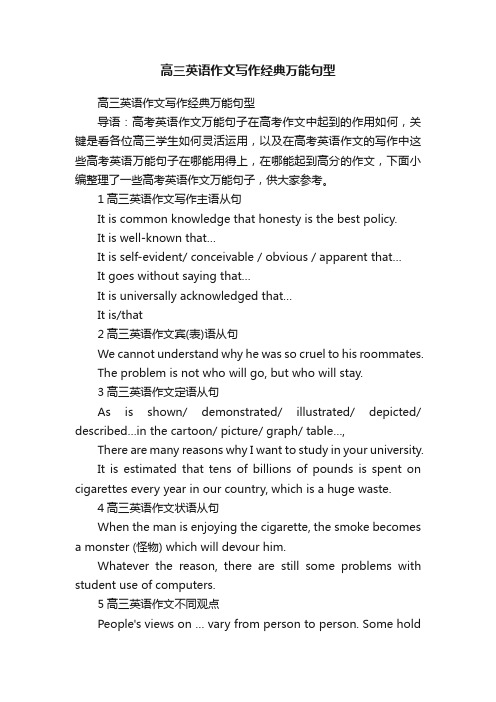
高三英语作文写作经典万能句型高三英语作文写作经典万能句型导语:高考英语作文万能句子在高考作文中起到的作用如何,关键是看各位高三学生如何灵活运用,以及在高考英语作文的写作中这些高考英语万能句子在哪能用得上,在哪能起到高分的作文,下面小编整理了一些高考英语作文万能句子,供大家参考。
1高三英语作文写作主语从句It is common knowledge that honesty is the best policy.It is well-known that…It is self-evident/ conceivable / obvious / apparent that…It goes without saying that…It is universally acknowledged that…It is/that2高三英语作文宾(表)语从句We cannot understand why he was so cruel to his roommates.The problem is not who will go, but who will stay.3高三英语作文定语从句As is shown/ demonstrated/ illustrated/ depicted/ described…in the cartoon/ picture/ graph/ table…,There are many reasons why I want to study in your university.It is estimated that tens of billions of pounds is spent on cigarettes every year in our country, which is a huge waste.4高三英语作文状语从句When the man is enjoying the cigarette, the smoke becomes a monster (怪物) which will devour him.Whatever the reason, there are still some problems with student use of computers.5高三英语作文不同观点People's views on … vary from person to person. Some holdthat …. However, others believe that….人们对……的观点因人而异.有些人认为……,然而其他人却认为……People may have different opinions on …人们对……可能会有不同的见解.Attitudes towards (drugs) vary from person to person.人们对待吸毒的'态度因人而异.There are different opinions among people as to …关于……,人们的观点大不相同.Different people hold different attitudes toward (failure). 对(失败)人们的态度各不相同。
【高考英语考前必背】 高考英语高效写作必备的三大从句与非谓语动词
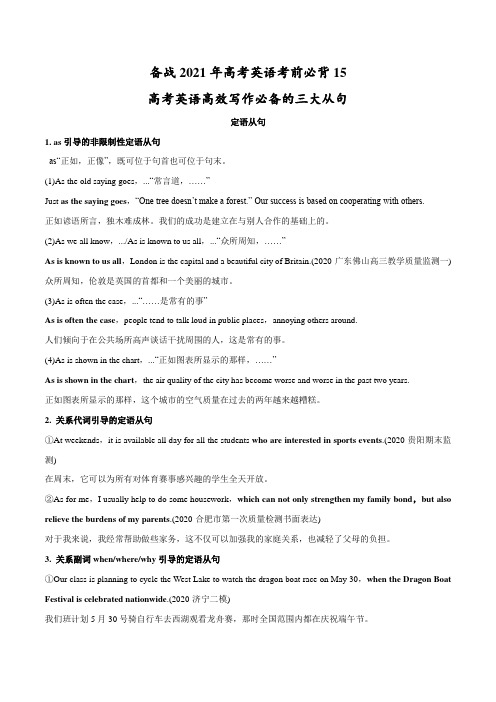
备战2021年高考英语考前必背15高考英语高效写作必备的三大从句定语从句1. as引导的非限制性定语从句as“正如,正像”,既可位于句首也可位于句末。
(1)As the old saying goes,...“常言道,……”Just as the saying goes,“One tree doesn’t make a forest.” Our success is based on cooperating with others.正如谚语所言,独木难成林。
我们的成功是建立在与别人合作的基础上的。
(2)As we all know,.../As is known to us all,...“众所周知,……”As is known to us all,London is the capital and a beautiful city of Britain.(2020·广东佛山高三教学质量监测一) 众所周知,伦敦是英国的首都和一个美丽的城市。
(3)As is often the case,...“……是常有的事”As is often the case,people tend to talk loud in public places,annoying others around.人们倾向于在公共场所高声谈话干扰周围的人,这是常有的事。
(4)As is shown in the chart,...“正如图表所显示的那样,……”As is shown in the chart,the air quality of the city has become worse and worse in the past two years.正如图表所显示的那样,这个城市的空气质量在过去的两年越来越糟糕。
2. 关系代词引导的定语从句①At weekends,it is available all day for all the students who are interested in sports events.(2020·贵阳期末监测)在周末,它可以为所有对体育赛事感兴趣的学生全天开放。
2022高考英语应用文写作高级句式之三大从句使用指导(考前必背)
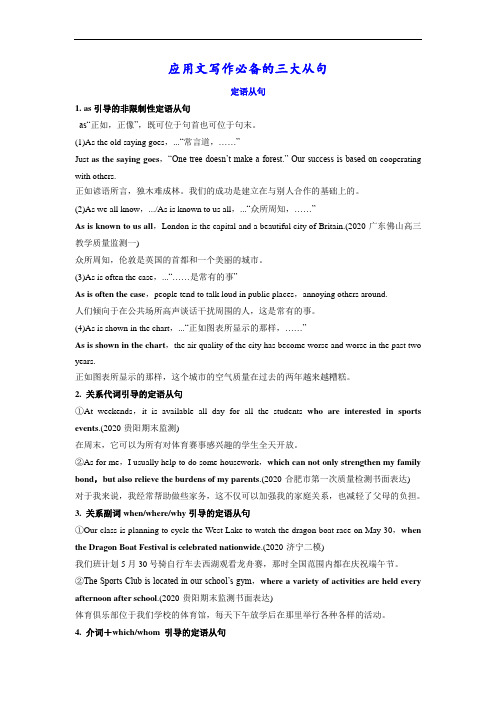
应用文写作必备的三大从句定语从句1. as引导的非限制性定语从句as“正如,正像”,既可位于句首也可位于句末。
(1)As the old saying goes,...“常言道,……”Just as the saying goes,“One tree doesn’t make a forest.” Our success is based on cooperating with others.正如谚语所言,独木难成林。
我们的成功是建立在与别人合作的基础上的。
(2)As we all know,.../As is known to us all,...“众所周知,……”As is known to us all,London is the capital and a beautiful city of Britain.(2020·广东佛山高三教学质量监测一)众所周知,伦敦是英国的首都和一个美丽的城市。
(3)As is often the case,...“……是常有的事”As is often the case,people tend to talk loud in public places,annoying others around.人们倾向于在公共场所高声谈话干扰周围的人,这是常有的事。
(4)As is shown in the chart,...“正如图表所显示的那样,……”As is shown in the chart,the air quality of the city has become worse and worse in the past two years.正如图表所显示的那样,这个城市的空气质量在过去的两年越来越糟糕。
2. 关系代词引导的定语从句①At weekends,it is available all day for all the students who are interested in sports events.(2020·贵阳期末监测)在周末,它可以为所有对体育赛事感兴趣的学生全天开放。
高考英语作文句型作文中的定语从句
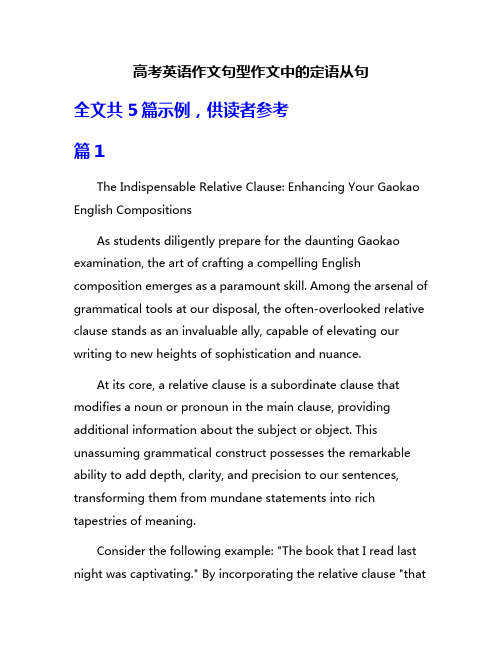
高考英语作文句型作文中的定语从句全文共5篇示例,供读者参考篇1The Indispensable Relative Clause: Enhancing Your Gaokao English CompositionsAs students diligently prepare for the daunting Gaokao examination, the art of crafting a compelling English composition emerges as a paramount skill. Among the arsenal of grammatical tools at our disposal, the often-overlooked relative clause stands as an invaluable ally, capable of elevating our writing to new heights of sophistication and nuance.At its core, a relative clause is a subordinate clause that modifies a noun or pronoun in the main clause, providing additional information about the subject or object. This unassuming grammatical construct possesses the remarkable ability to add depth, clarity, and precision to our sentences, transforming them from mundane statements into rich tapestries of meaning.Consider the following example: "The book that I read last night was captivating." By incorporating the relative clause "thatI read last night," we have not only identified the specific book in question but also provided crucial context about our interaction with it. This simple addition breathes life into the sentence, painting a vivid picture for the reader and fostering a deeper connection with the subject matter.Moreover, relative clauses offer a powerful means of expressing complex ideas with elegance and economy. Rather than relying on cumbersome explanations or lengthy asides, we can seamlessly weave additional details into our sentences, creating a more cohesive and immersive reading experience. For instance, "The novel, which explored themes of love, loss, and redemption, left an indelible mark on my literary consciousness." In this single sentence, the relative clause unveils a wealth of information about the novel's thematic content, enriching the reader's understanding without disrupting the narrative flow.Beyond their descriptive prowess, relative clauses also possess a remarkable ability to establish logical connections and convey nuanced relationships between ideas. By strategically employing these clauses, we can guide the reader's thought process, elucidating the intricate web of concepts that underpin our arguments. Consider the following: "The philosopher whose ideas challenged conventional wisdom inspired a generation ofcritical thinkers." Here, the relative clause not only identifies the specific philosopher but also hints at the profound impact of their work, setting the stage for further exploration and analysis.In the context of the Gaokao English composition, the judicious use of relative clauses can elevate our writing to a level of sophistication that commands the attention of discerning evaluators. By artfully weaving these clauses into our narratives, we demonstrate a mastery of the English language and a keen understanding of its intricacies, qualities that are sure to impress even the most seasoned examiners.However, it is crucial to strike a delicate balance when incorporating relative clauses into our compositions. An overabundance of these constructs can lead to convoluted sentences that obscure meaning and hinder comprehension. As with any rhetorical device, moderation and thoughtful application are key to achieving the desired effect.In conclusion, the relative clause stands as an indispensable tool in the Gaokao English composition arsenal. By harnessing its descriptive power, logical clarity, and narrative fluency, we can craft compositions that resonate with readers, captivating their imaginations and leaving an indelible impression. As we embark on our Gaokao journey, let us embrace the relative clause as atrusted companion, one that will undoubtedly elevate our writing to new and extraordinary heights.篇2The Mastery of Relative Clauses: A Pivotal Key to Unlocking Gaokao English Writing SuccessAs students diligently prepare for the formidable Gaokao English examination, one crucial aspect that demands unwavering attention is the artful incorporation of relative clauses into their writing. These grammatical constructs, often referred to as adjective or adjectival clauses, possess a remarkable ability to enhance the depth, clarity, and sophistication of one's expression. Mastering their usage is not merely a matter of technical prowess but a testament to one's command of the English language and a gateway to achieving remarkable scores on the coveted exam.Relative clauses, in essence, are clauses that modify and provide additional information about a noun or noun phrase within a sentence. They serve as descriptive bridges, connecting ideas and painting vivid word pictures that engage the reader's imagination. By skillfully incorporating these clauses, writers canimbue their compositions with a level of detail and nuance that sets them apart from the ordinary.Consider the following example: "The student who consistently practices relative clauses will excel in the Gaokao English writing section." In this sentence, the relative clause "who consistently practices relative clauses" provides crucial information about the specific type of student being discussed, distinguishing them from those who may not prioritize this aspect of their studies. Without this clause, the sentence would lack the necessary specificity and depth, potentially leaving the reader with a vague or incomplete understanding.Moreover, relative clauses offer a remarkable level of versatility, enabling writers to convey complex ideas with elegance and precision. They can be employed to provide additional context, clarify ambiguities, or even inject a touch of literary flair into one's writing. For instance, "The examination hall, where students' dreams and aspirations converge, became a crucible of determination" evokes a powerful image that transcends mere factual description.Effective use of relative clauses requires careful attention to grammar rules and a keen understanding of their various forms. Restrictive relative clauses, which are essential to the meaning ofthe sentence, must be distinguished from non-restrictive clauses, which merely offer supplementary information. Mastering this distinction is crucial, as improper usage can lead to confusion or ambiguity, potentially undermining the clarity of one's writing.Furthermore, relative clauses can be employed to create intricate sentence structures that showcase one's command of the English language. By skillfully nesting clauses within clauses, writers can weave intricate tapestries of thought, captivating their readers with their linguistic dexterity. However, it is essential to strike a balance between complexity and coherence, ensuring that one's ideas remain accessible and readily comprehensible.Beyond their practical applications in the Gaokao English writing section, relative clauses hold a deeper significance. They represent a gateway to the richness and nuance of the English language, inviting students to explore the boundless possibilities of expression. By mastering their usage, students not only enhance their chances of academic success but also cultivate a lifelong appreciation for the art of language and the power of words to shape and influence human understanding.In conclusion, the journey toward Gaokao English writing excellence is paved with a multitude of grammatical andlinguistic considerations, among which the mastery of relative clauses stands as a towering milestone. Through diligent practice, unwavering dedication, and a deep reverence for the intricacies of the English language, students can harness the transformative power of these clauses, elevating their writing to new heights of clarity, depth, and artistry. Embrace the challenge, revel in the linguistic journey, and let relative clauses be the guiding light that illuminates your path to Gaokao English writing triumph.篇3The Mastery of Relative Clauses: Unlocking Sophistication in Your Gaokao English WritingAs you embark on your journey to conquer the Gaokao English exam, one crucial aspect that can elevate your writing prowess is the adept use of relative clauses. These clauses, when employed skillfully, add depth, complexity, and nuance to your expressions, allowing you to convey your thoughts with precision and sophistication.Relative clauses, also known as adjective clauses, are subordinate clauses that modify a noun or pronoun in the main clause. They provide additional information about the noun or pronoun, helping to clarify, describe, or identify it more precisely.By incorporating relative clauses into your writing, you can create more vivid and descriptive sentences, enhancing the overall quality and impact of your compositions.There are two main types of relative clauses: defining (restrictive) and non-defining (non-restrictive). Defining relative clauses are essential to the meaning of the sentence, as they identify the specific noun or pronoun being referred to. For example, "The book that won the award is a best-seller." Without the relative clause "that won the award," the sentence would be unclear about which book is being discussed.On the other hand, non-defining relative clauses provide additional, non-essential information about the noun or pronoun. They are typically set off by commas and can be removed without affecting the core meaning of the sentence. For instance, "My friend, who loves to read, has an extensive library." The relative clause "who loves to read" gives extra details about your friend but is not crucial to identifying them.To effectively incorporate relative clauses into your Gaokao English writing, here are some tips and strategies:Vary your relative pronouns: While "that" and "which" are common relative pronouns, using a variety of relative pronounssuch as "who," "whom," "whose," and "where" can add diversity and sophistication to your writing.Use both defining and non-defining clauses: Strike a balance between using defining clauses for clarification and non-defining clauses for additional description or context.Avoid ambiguity: Ensure that your relative clauses clearly modify the intended noun or pronoun, preventing any confusion or ambiguity in your writing.Practice combining clauses: Experiment with combining multiple relative clauses in a single sentence to create more complex and nuanced expressions.Employ strategic placement: Carefully consider the placement of your relative clauses within sentences to achieve the desired emphasis and flow.Here are a few examples that showcase the effective use of relative clauses in English writing:Defining Relative Clause:"The documentary that explores the impact of climate change on polar regions is a must-watch for environmentalists."Non-defining Relative Clause:"My English teacher, whose passion for literature is contagious, has inspired me to delve deeper into the works of Shakespeare."Combined Relative Clauses:"The novel that captivated readers worldwide, which was written by a renowned author, explores themes of love, loss, and redemption."As you practice incorporating relative clauses into your Gaokao English writing, you will not only enhance the depth and sophistication of your expressions but also demonstrate your command of advanced grammatical structures. This mastery will undoubtedly impress your examiners and set your compositions apart from the rest.Remember, the journey to excellence in English writing is a continuous process of learning, practice, and refinement. Embrace the challenge of mastering relative clauses, and watch as your writing transforms into a powerful and compelling tapestry of words, capable of leaving a lasting impact on your readers.篇4Mastering the Art of Relative Clauses: A Pathway to Sophisticated WritingIn the realm of English language proficiency, few elements hold as much power as the ability to construct intricate and nuanced sentences. Among the tools that facilitate this pursuit, relative clauses stand as a beacon of sophistication, enabling writers to convey complex ideas with clarity and precision. As students prepare for the formidable Gaokao examination, mastering the art of relative clauses becomes an indispensable skill, one that can elevate their writing to new heights of eloquence and depth.At the heart of relative clauses lies the capacity to provide additional information about a noun or pronoun, thereby enriching the overall meaning and impact of a sentence. These clauses, introduced by relative pronouns such as "who," "which," "that," "whose," and "whom," serve as descriptive modifiers, painting vivid pictures and enhancing the reader's understanding.Consider the following example: "The book, which was written by a renowned author, captivated readers worldwide." Here, the relative clause "which was written by a renownedauthor" adds crucial detail to the noun "book," transforming a simple statement into a more compelling and informative one.Beyond mere description, relative clauses can also convey essential context, allowing writers to seamlessly integrate background information or explanations within their sentences. This technique is particularly valuable in academic and professional settings, where concision and clarity are paramount. For instance, "The theory, which challenges long-held assumptions, has sparked heated debates among scholars."Moreover, relative clauses serve as powerful tools for emphasis and prioritization. By strategically positioning these clauses, writers can guide the reader's attention to the most crucial elements of their narrative or argument. A well-placed relative clause can elevate the significance of a particular detail or concept, underscoring its importance within the broader context.Yet, the true mastery of relative clauses extends beyond mere mechanics; it lies in the ability to wield them with elegance and purpose. Effective writers understand the nuances of relative clause placement, recognizing when to employ restrictive clauses (those that are essential to the meaning of the sentence)and when to use non-restrictive clauses (those that provide additional, non-essential information).For example, the sentence "Students who excel in English composition are more likely to succeed in the Gaokao" employs a restrictive relative clause, limiting the reference to a specific subset of students – those proficient in English writing. Conversely, "The Gaokao, which is a national college entrance examination, is a pivotal milestone for Chinese students" utilizes a non-restrictive clause, providing supplementary information about the already identified noun.As students navigate the intricate landscape of English composition, the judicious use of relative clauses can elevate their writing to new levels of sophistication and impact. By skillfully incorporating these clauses, they can craft sentences that are not only grammatically correct but also rich in meaning, nuance, and persuasive power.In the context of the Gaokao examination, where every word carries weight and precision is paramount, the effective deployment of relative clauses can be a game-changer. These clauses enable students to express complex ideas with clarity and depth, demonstrating their mastery of the English language and their ability to communicate at a higher level.Furthermore, the strategic use of relative clauses can contribute to the overall coherence and flow of an essay or composition. By seamlessly integrating descriptive and explanatory information, writers can create a seamless narrative that guides the reader through their thought process, fostering a deeper understanding and appreciation of their arguments or perspectives.In the pursuit of linguistic excellence, the art of relative clauses stands as a testament to the beauty and complexity of the English language. Through diligent practice and a keen understanding of their nuances, students can unlock a world of expressive possibilities, transforming their writing from mere words on a page to a tapestry of elegance and depth.As the Gaokao looms on the horizon, embracing the power of relative clauses becomes not merely a grammatical exercise but a pathway to unlocking one's full potential as a writer and communicator. By mastering this essential skill, students can confidently approach the examination, armed with the tools to articulate their thoughts with unparalleled clarity and sophistication, leaving a lasting impression on their readers and paving the way for future academic and professional success.篇5The Mastery of Relative Clauses: A Path to Eloquence in English CompositionIn the realm of English language mastery, few elements carry as much weight as the humble relative clause. These modifying phrases, nestled within sentences, possess an unassuming power to infuse clarity, nuance, and sophistication into written expression. For students aspiring to excel in the high-stakes arena of college entrance exams, a command over relative clauses is not merely a grammatical nicety; it is a formidable weapon in the arsenal of effective communication.At their core, relative clauses serve as descriptive tools, lending depth and precision to the nouns they modify. They allow writers to convey intricate details, qualifying characteristics, and contextual richness that would otherwise remain elusive. Consider the stark contrast between a sentence devoid of relative clauses, such as "The student passed the exam," and one adorned with a deftly crafted relative clause: "The student, whose unwavering determination fueled countless sleepless nights, passed the exam with flying colors." The latter paints a vivid picture, illuminating the student's journey and imbuing the achievement with a sense of hard-earned triumph.Yet, the true mastery of relative clauses extends far beyond mere embellishment. These linguistic constructs possess a remarkable versatility, enabling writers to weave intricate tapestries of thought and emotion. Through the judicious use of relative clauses, one can seamlessly interweave multiple strands of information, creating a rich tapestry of ideas that captivates the reader's attention and cultivates a deeper understanding of the subject matter.In the context of the high-stakes college entrance exam, where every word carries significant weight, the effective deployment of relative clauses can prove invaluable. These modifying phrases allow writers to convey complex concepts, intricate narratives, and nuanced arguments within the constraints of a limited word count. By skillfully employing relative clauses, students can craft compositions that resonate with depth, precision, and eloquence, elevating their work above the fray of pedestrian prose.Moreover, the mastery of relative clauses is not merely a matter of grammatical correctness; it is a testament to one's linguistic dexterity and command of the English language. A writer adept at wielding relative clauses demonstrates a level of sophistication and attention to detail that resonates withevaluators, signaling a level of intellectual maturity and linguistic prowess befitting of a successful college applicant.Yet, as with any aspect of language, the pursuit of mastery demands dedication and practice. Aspiring writers must immerse themselves in the study of relative clauses, exploring their nuances, variations, and contextual applications. They must hone their skills through diligent exercises, crafting sentences that seamlessly incorporate these modifying phrases, ensuring precision, clarity, and elegance in their compositions.In the end, the journey towards mastering relative clauses is not merely a grammatical exercise; it is a voyage ofself-discovery, a testament to one's commitment to the art of language, and a pathway to unlocking the full potential of one's expressive capabilities. For those brave souls who undertake this quest, the rewards are manifold: a heightened command of the English language, a newfound confidence in their written expression, and a heightened ability to communicate their thoughts and ideas with unparalleled clarity and eloquence.So, let us embrace the challenge of mastering relative clauses, for within their deceptively simple structures lies a world of linguistic richness, a gateway to articulate self-expression, anda testament to our unwavering pursuit of excellence in the realm of English composition.。
